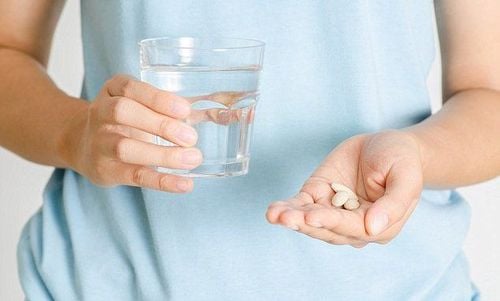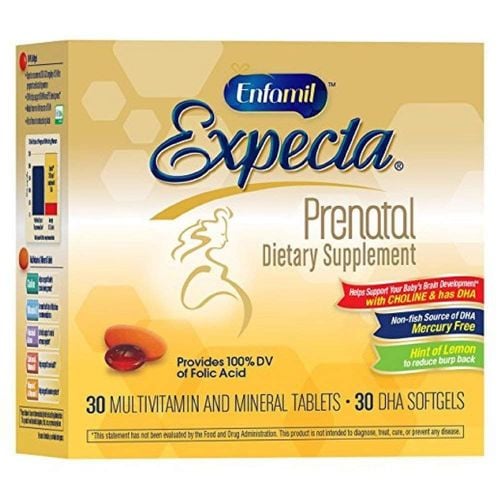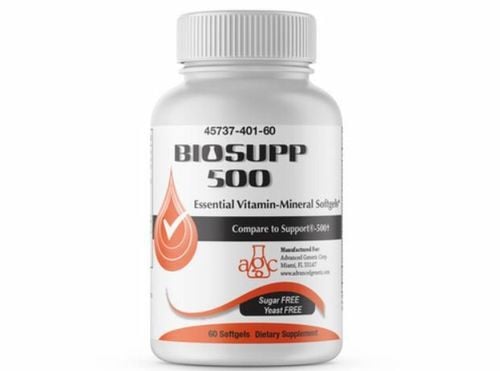This is an automatically translated article.
Vitamins are nutrients that help the body stay healthy and have enough energy for daily activities. Some vitamins are water-soluble and are carried to the body's tissues but not stored. This vitamin is found in many animal and plant foods or supplements and must be taken daily.
A water-soluble vitamin (as opposed to a fat-soluble vitamin) is not stored in the body, it is absorbed quickly and it is then normally excreted in the urine. Due to the fact that water-soluble vitamins cannot be stored, the body needs a constant supply through a steady daily amount. This can be through the foods, supplements we take, or from a combination of the two.
Water-soluble vitamins are found in fruits, vegetables and whole grains. Unlike fat-soluble vitamins, water-soluble vitamins can be destroyed by heat or exposure to air. They can also be lost in the water used for cooking, which means when cooking foods, especially by boiling. The best way to keep as many water-soluble vitamins as possible is to steam or bake foods.
Each water-soluble vitamin has a different function and can be found in different foods. Water-soluble vitamins include:
Vitamin C ; B-complex vitamins; Thiamine (Vitamin B1); Riboflavin (Vitamin B2); Niacin (Vitamin B3); Pantothenic acid (Vitamin B5); Vitamin B6; Vitamin B9 (folate); Vitamin B12 (cobalamin); Biotin (Vitamin H).
1. Vitamin C
It is also known as ascorbic acid - is an antioxidant, which helps protect cells and keep them healthy. The body needs collagen to make collagen (the most abundant protein in the body that helps keep bones, skin, teeth, and blood vessels healthy). Contrary to popular belief, Vitamin C doesn't help with the common cold, but it does keep the immune system healthy. Vitamin C is an ingredient that helps the body absorb iron. Vitamin C is found only in vegetables and fruits, most notably citrus fruits. Vitamin C can also be found in many vegetables, mainly those in the cabbage family.
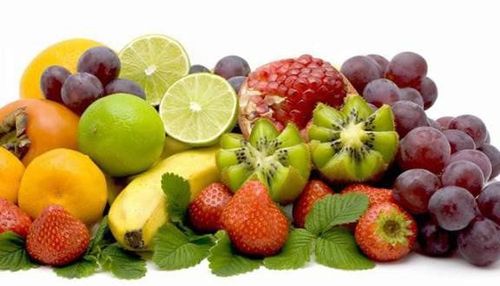
Vitamin tan trong nước được tìm thấy trong trái cây, rau và ngũ cốc
2. Thiamin (also known as Vitamin B1)
Vitamin B1 works with other B vitamins to help break down and release energy from food, break down alcohol, and metabolize carbohydrates and amino acids. Vitamin B1 also plays an important role in the transmission of nerve impulses by keeping the nerves healthy. Vitamin B1 is important for nerve function and energy metabolism. Vitamin B1 is found in all foods with nutritional value. Those foods include whole grains and breads, nuts, seeds, pork, and legumes.
3. Riboflavin (also known as Vitamin B2)
Vitamin B2 keeps the skin, eyes and nervous system healthy and helps the body metabolize carbohydrates, proteins and fats. Riboflavin also enhances the function of several other B Vitamins, Niacin and Vitamin B12. Vitamin B2 is also used for energy metabolism as well as for overall skin and eye health. Vitamin B2 can be found in whole grain breads and cereals, dairy products, and green vegetables. Vitamin B2 can also affect the metabolism of other vitamins such as folate, iron, niacin, and vitamin B6.
4. Niacin (also known as Vitamin B3)
Vitamin B3 helps produce energy from the food we eat as well as helps keep the nervous and digestive systems healthy. Vitamin B3 protects the health of skin cells and keeps the digestive system functioning properly. In large amounts, Vitamin B3 can help lower LDL and triglyceride levels and raise HDL (good cholesterol) levels. Vitamin B3 is another vitamin needed for energy metabolism. Vitamin B3 also supports the digestive and nervous systems and keeps the skin healthy. You can find vitamin B3 in many foods including fish, meat, whole grains and breads, vegetables, poultry, and peanut butter. In fact, vegetables have the highest levels of niacin, especially asparagus, green leafy vegetables, and mushrooms. As a result, vegetarians and vegans can have more peace of mind about their Vitamin B3 levels.
5. Pantothenic acid
Allows the body to obtain energy from carbohydrates, proteins and fats. Your body also uses Pantothenic Acid, which is the type to produce hormones and cholesterol. Pantothenic acid can be found in most foods of animal and plant origin. Foods with the most pantothenic acid include: organ meats, certain vegetables, beef, whole grains, and chicken. Like other water-soluble vitamins, pantothenic acid is mainly used by the body for energy metabolism.
6. Pyridoxine (Vitamin B6)
Vitamin B6 Also known as Pyridoxine, vitamin B6 acts as a co-enzyme that helps chemical reactions take place. Vitamin B6 plays an important role in making non-essential amino acids and helping your body break down glycogen, which is the storage form of glucose. Vitamin B6 also helps your body metabolize carbohydrates, proteins, and fats and keeps your immune system and nervous system healthy. Vitamin B6 helps the body with metabolism and the production of red blood cells. It can be found in many animal products such as poultry, meat and fish, but also in fruits and vegetables.
7. Folic Acid
Called Folate in its natural form, it works together with Vitamin B12 to form healthy red blood cells. Since your body needs folate to make DNA, it plays an extremely important role in preventing birth defects during early pregnancy. Folic acid is used to produce new cells in the body, specifically the cells in the nails, skin, and hair. New cells in these and other areas are created every day. Folic acid is mainly found in fortified foods including pasta, breakfast cereals, breads, and rice. Folic acid, which is the synthetic form of the vitamin folate, is an even more important part of a woman's diet, especially those who are pregnant or trying to conceive. For women who are pregnant, folic acid helps reduce the risk of major birth defects, including spina bifida and anencephaly. The Centers for Disease Control and Prevention recommends that women of childbearing age take 400mcg of the vitamin a day.
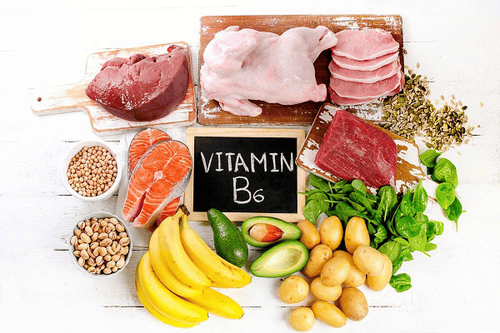
Vitamin B6 hoạt động như một đồng enzyme giúp các phản ứng hóa học diễn ra
8. Cobalamin (Vitamin B12)
Vitamin B12 is involved in the creation of red blood cells and keeping the nervous system healthy. The body also needs vitamin B12 to metabolize fatty acids and amino acids and synthesize DNA in your cells. is important for the function of nerves in the body and the production of new cells. Vitamin B12 can only be found in animal products, including poultry, seafood, dairy products, eggs, meat, and milk.
9. Biotin (Vitamin H)
Biotin supports the metabolism of glucose, amino acids and fatty acids. Biotin is found in most foods in varying concentrations and is also produced by the body by gut bacteria.
A total of 8 water-soluble vitamins are from the vitamin B group. These include riboflavin, thiamin, niacin, folate, vitamin B6, biotin, pantothenic acid and vitamin B12. These vitamins help the body turn food into energy and are important for the nervous system, healthy skin, the formation of red blood cells, normal healthy appetite, and good vision.
10. Do you have a water-soluble vitamin deficiency?
The signs of a water-soluble vitamin deficiency are varied, as deficiency symptoms vary by vitamin type. For example, a vitamin C deficiency can manifest with easy bruising, wounds that take a long time to heal, and swollen joints.
Symptoms of vitamin B complex deficiency also manifest according to that vitamin. If you are deficient in B1, you may become depressed or eat less, while with vitamin B2, your mouth may become sore and your lips chapped. With a vitamin B3 deficiency, you may experience confusion or diarrhea. A vitamin B6 deficiency can lead to anemia or damage to the nerves. B12 deficiency also leads to anemia, but can also be accompanied by signs of infertility.
Please dial HOTLINE for more information or register for an appointment HERE. Download MyVinmec app to make appointments faster and to manage your bookings easily.





